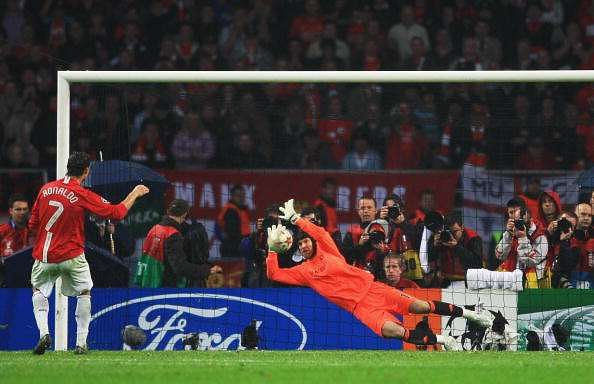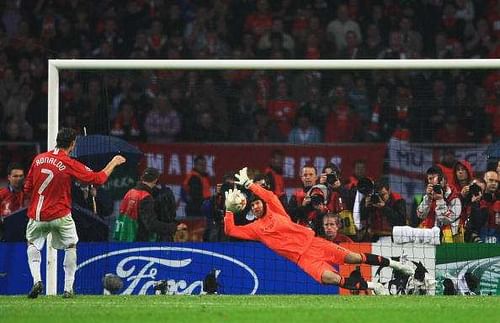
A closer look at the 2008 Champions League final penalty shootout

While on vacation, I had the opportunity to pick up a few books on football, among which one was Soccernomics. The book is jointly authored by sports journalist Simon Kuper and sports economist Stefan Szymanski. The book explores how the study of statistics and raw data have influenced the modern game.
At one point they talk about penalty kicks. They provide a counter-argument against popular opinion that states that penalties are an unfair way to decide a game because at the end of the day it all comes down to luck. To prove their argument they bring up various examples, one of which is the 2008 Champions League final penalty shoot-out between Manchester United and Chelsea in the Luzhniki Stadium at Moscow.
In that match, Chelsea tried their best to use ‘game theory’ to win the penalty shoot-out. Game theory is a concept allows any kind of team to win a shoot-out, making it look like there isn’t any element of luck involved. Let us delve deeper into what game theory really is.
Game theory was developed by various scientists and mathematicians, one of which was John von Neumann. It is the study of situations in which what one person does depends on what another person does, and vice versa.
This can be explained with real-life examples. Let’s look at the race for acquiring nuclear weapons. Say country A has a close rivalry with country B. Country B isn’t sure whether country A will develop or not develop some kind of nuclear missile, so it uses game theory to predict.
If country A has no nuclear missiles, country B would contemplate doing either of the following two things:
(a) We don’t get a missile. There will always be incidents such as this, and we can live with it.
(b) We get the missile. We will gain country A’s respect and they won’t be attacking us again.
If country A has a nuclear missile, country B would contemplate doing either of the following two things:
(a) We don’t get a missile. By the time we’re done making it and they hear about it, we would be in ashes.
(b) We get the missile. We will gain country A’s respect and they won’t be attacking us again.
This shows that the equilibrium of the race for nuclear weapons is for both countries to acquire nuclear missiles.
The logic of all football matches is pretty much the same; for penalties, however, it is not. Penalties are, as the authors put it , a ‘zero-sum game’. Any gain for one player is exactly offset by the loss to the other side, or simply put, a +1 for me is -1 for you.
Professionals play Minimax is a paper published in 2003 by Basque economist Igancio Palacios-Huerta, who started recording the way penalties were taken since 1995. It can remarkably be found here, though it isn’t quite on the intellectual level of a common man. Minimax simply means denoting a method or strategy in game theory that minimises the greatest risk to a participant in a game or other situation of conflict. Penalty kicks are a fine example.
Ignacio and Avram Grant, the then Chelsea manager, had a common friend. Upon Chelsea’s entry into the final, the middle-man got them in touch with each other as he knew one could help the other. Grant was instantly mesmerised by Ignacio’s line of work and desperately asked him to help him out. As he sat on the plane to Moscow, he was beyond delighted to receive some good news.
The economist had done an extensive study on United’s goalkeeper and penalty-takers. He then went on to state four main points that would have a direct effect on the shoot-out:
1. Van der Sar tends to dive to the kicker’s ‘natural side’ more often than most keepers did. This meant that when facing a right-footed kicker, the goalkeeper would usually dive to his own right, and when facing a left-footed kicker, to his own left. Chelsea would have a better chance to win the European Cup if their penalty takers kicked towards their unnatural side.
2. A vast majority of the penalties Van der Sar stops are those kicked around the height between 1 and 1.5 meters. Therefore the penalty takers must always aim to hit it just on the ground or high up; never in mid-height .
3. Ronaldo often stops in the run-up to the ball. If he stops, there is an 85% chance he’ll kick to the right-hand side of the goalkeeper because he won’t be able to generate enough power after 120 minutes of football to score towards his left. When a keeper moved early, Ronaldo always scored. The key is to not move.
4. The team that wins the toss has a 60% chance of winning because there is too much pressure on the team going second.
Once you have read this, your entire memory of the shoot-out is changed forever. The Chelsea players mugged up the letter, word for word. There was absolutely no reason for them to go wrong, until Anelka stepped up to take his penalty.